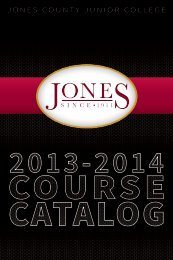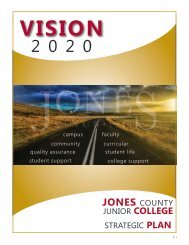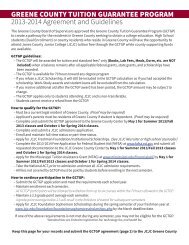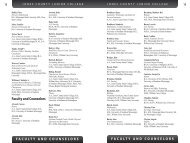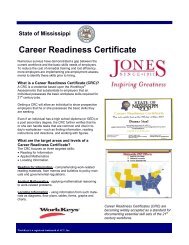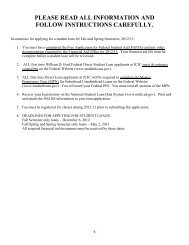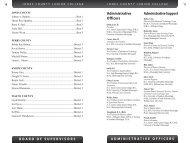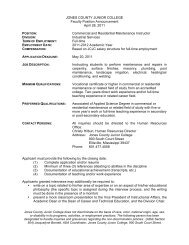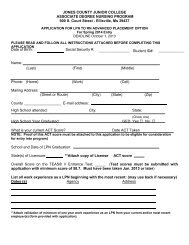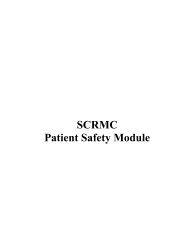Jones Upclose - Orientation Packet - Jones County Junior College
Jones Upclose - Orientation Packet - Jones County Junior College
Jones Upclose - Orientation Packet - Jones County Junior College
You also want an ePaper? Increase the reach of your titles
YUMPU automatically turns print PDFs into web optimized ePapers that Google loves.
Faculty Advisement<br />
All students have faculty advisors with whom they meet periodically. Advisors<br />
assist students with helping to plan a schedule, providing career information,<br />
referring students to proper sources for information, and encouraging academic<br />
endeavors. Students retain their advisors for the duration of enrollment at<br />
<strong>Jones</strong>. You are required to meet with your advisor during the first full week of<br />
school. Students wishing to change majors should do so online at www.jcjc.edu<br />
then clicking on Current Students and Request Change of Major.<br />
Drop/Add Process<br />
Students may make changes to their schedule (drop/add classes) free of charge<br />
via PeopleSoft anytime between pre-registration and the beginning of classes.<br />
Beginning the first day of class, students who want to make changes to their<br />
schedule must:<br />
1. Complete a drop/add form in the Student Success Center<br />
2. Get the signature of the instructor(s) for the dropped/added class<br />
3. Return the form to the Student Success Center to process the transaction<br />
To drop online courses after classes have started, students must contact<br />
their online instructor to complete the withdrawal process.<br />
Withdrawal from the <strong>College</strong><br />
The permanent record of a student withdrawing from the <strong>College</strong> is not complete<br />
until they have officially withdrawn. The correct procedure is to consult with the<br />
Student Success Center to secure and complete an official withdrawal form. The<br />
withdrawal will then become part of the student’s permanent record.<br />
Students who leave school without following this procedure will be subject<br />
to all applicable tuition and fees. Students should withdraw in person and<br />
see that their withdrawal forms are signed by the proper officials. However, in<br />
extenuating circumstances, students may withdraw via email.<br />
Students wishing to withdraw from a single class should make an appointment<br />
to see their advisor. The advisor will review the student’s academic plan and if it<br />
is determined to be in the best interest of the student, the advisor will submit the<br />
withdrawal request.<br />
Advisement Expectations<br />
Academic advising at <strong>Jones</strong> is not exactly like your experience with counseling in<br />
high school. Students and advisors together contribute to successful advising.<br />
You must take the initiative in contacting your college advisor and assuming the<br />
responsibility for your schedule of classes. As in any counseling relationship, what<br />
you discuss with your advisor is confidential information and is treated as such.<br />
• You are very much in charge of the relationship with your<br />
academic advisor. While your advisor may contact you, it is<br />
up to you to use your advisor’s services.<br />
• Know a variety of ways to communicate with your advisor.<br />
Know your advisor’s name, phone number, email address and<br />
office location.<br />
• Introduce yourself when you call or visit. Your advisor may<br />
work with up to 100 students, so it is hard to recall names and<br />
details spontaneously. Even if you think your advisor knows<br />
you, giving your preferred first name and your last name is a<br />
polite and helpful gesture.<br />
• Don’t be shy about saying hello or introducing yourself when<br />
you see your advisor crossing campus, at a sports event,<br />
cultural performance, or grocery store.<br />
• Start with your advisor when you are seeking help to solve<br />
problems that affect your academic performance. Be open<br />
and honest with your advisor.<br />
The main goal of advising is your academic success. Your advisor is committed to<br />
that goal. However, you are responsible for your education. You need to decide<br />
what you want and learn the requirements that must be met to achieve your goal.<br />
Your advisor is just that, an advisor, and, as such, is an important resource for your<br />
academic success. Contact your advisor whenever you have questions or concerns.



